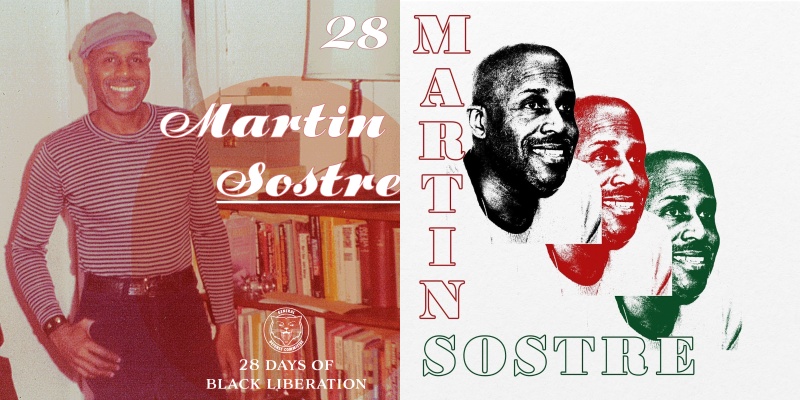Day 28 of the 28 Days of Black Liberation 2024 series
Martin Sostre was a revolutionary and a progenitor of Black Anarchism whose versatile politics transformed incarcerated organizing and laid the foundation for Black Autonomy. Born in Harlem in 1923, Sostre grew up listening to his father “talk communism” and street preachers extolling Black nationalism. Like many young Black men in America, Sostre ended up hustling on the street and ultimately was trapped in the clutches of the American carceral system.
Sostre said that “Living in the streets by your wits makes you alert. In jail I decided to put that sharpened awareness to another purpose. For the first time, I had a chance to think, and began reading everything I could — history, philosophy, and law.” He became a Muslim, gravitating toward the Black Nationalist political line, transforming himself into a “politicized” prisoner.
Described as a prolific jailhouse lawyer, he changed the face of the American Prison Movement by setting precedent cases for incarcerated religious rights, which he won in the landmark case Sostre v. LaVallee.
Sostre was freed from Attica in 1964, and opened up the Afro Asian Book Shop in Buffalo, New York. The Book Shop became a hub for revolutionary political education and a community space for young Black people. Shifting away from the Nation of Islam, Sostre stocked communist publications such as Mao’s Little Red Book. Recognizing the danger posed by Sostre and his book shop, he was framed on arson, rioting, and drug trafficking charges as part of the FBI’s COINTELPRO.
Sostre returned to jail, having gone from a “politicized” to “political” prisoner. Winning several more landmark cases, it was in this period that Sostre began studying Anarchist literature. Frustrated with more centralized forms of organizing, he re-organized his defense campaign into autonomous decentralized units.
His bold challenges against the state further inspired other prisoners to rise up in similar fashion, marking the 1970s as the “Rebellion Years” of the American prison movement. Sostre was ultimately able to beat the spurious charges against him and was granted clemency in 1976. He passed away in 2015.
This article was written by our comrades from Study and Struggle.
In the United States, the Black liberation struggle is the vanguard of the revolutionary class struggle. Black resistance to white supremacy has been the catalyst for nearly all critical social ruptures throughout american history. White workers choosing an alliance with the bosses instead of siding with the rest of the working class is the primary roadblock to revolutionary anti-capitalism in the US.
The GDC celebrates the Black liberation struggle and draws inspiration and lessons from its proud history in our struggle for the new world we are fighting for. In February we celebrate Black revolutionary culture, political prisoners, international figures and struggles, and moments in direct action that guide us in our continued, collective fight for liberation!

